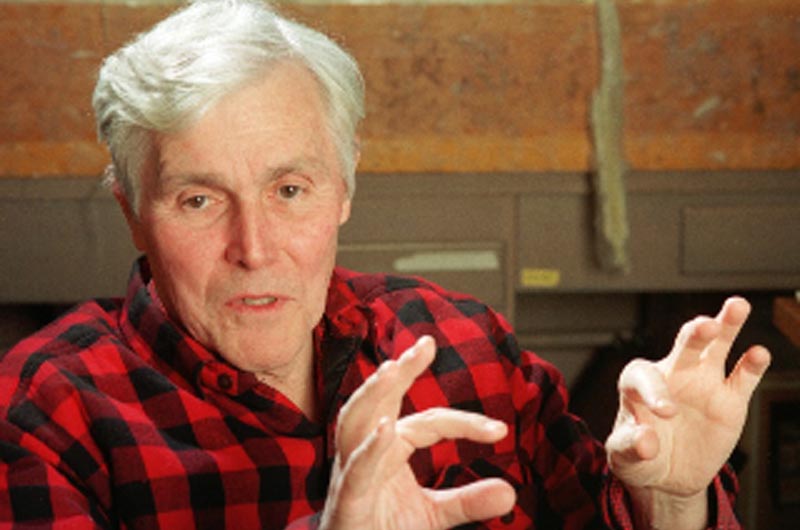University of Illinois microbiology and Institute for Genomic Biology professor Carl R. Woese, who adopted a molecular approach to classifying organisms and upended taxonomy with the discovery of a “third domain” of life, died Sunday, Dec. 30 at his home in Urbana, Ill. He was 84.
Mr. Woese and his colleagues wrote two papers published in 1977 that overturned a universally-held assumption about the basic structure of the tree of life. They reported that the microbes now known as archaea (are-KEY-uh) were as distinct from bacteria as plants are to animals. Prior to this finding, scientists had lumped archaea together with bacteria, and asserted that the tree of life had two main branches — the bacteria (which they called prokarya), and everything else (the eukarya). The new discovery added archaea as a third main branch of the evolutionary family tree.
The discovery stemmed from Mr. Woese’s painstaking analysis of the ribosome, a protein-building machine abundant in all living cells. Rather than classifying organisms by observing their physical traits, as others had done, Mr. Woese looked for evolutionary relationships by comparing genetic sequences. He focused on a subunit of the ribosome, and found that the ribosomal sequences of some methane-producing microbes formed a new group that was distinct from bacteria and from all other organisms. He named this group the archaeabacteria (which was later shortened to archaea).
“Carl was truly a man of vision, creativity and passion, with a deep love of this university,” said Gene Robinson, the director of the Institute for Genomic Biology at Illinois. “Carl not only rewrote the textbook in evolutionary biology, but his discovery also has given us the tools today to study the human microbiome, the incredibly diverse and complex assemblages of microorganisms in our bodies that contribute so much to both health and disease.”
“We are all saddened at the passing of Carl and our collective thoughts are with his family,” said Phyllis M. Wise, the chancellor of the Urbana-Champaign campus. “It is truly impossible to adequately describe or to categorize his contributions to the University of Illinois, to biology and to the world during his long and distinguished career here. The campus community has lost one of our giants this week.”
Born July 15, 1928, in Syracuse, N.Y., Mr. Woese earned degrees in math and physics from Amherst College in 1950 and a Ph.D. in biophysics at Yale University in 1953. He studied medicine for two years at the University of Rochester, spent five years as a post-doctoral researcher in biophysics at Yale, and worked as a biophysicist at the General Electric Research Laboratory in Schenectady, N.Y. He joined the faculty of the University of Illinois in 1964 as professor of microbiology and has served in that capacity ever since. He enjoyed his summers in Chilmark with his family.
Mr. Woese received a MacArthur Foundation grant in 1984 and was elected to the National Academy of Sciences in 1988. He was awarded the 1992 Leeuwenhoek Medal (microbiology’s premier honor, awarded by the Royal Netherlands Academy of Arts and Sciences); and he received a National Medal of Science in 2000. In 2003, Mr. Woese received the Crafoord Prize in Biosciences, administered by the Royal Swedish Academy of Sciences, which also awards the Nobel Prize. (The Crafoord is widely considered the equivalent of the Nobel Prize for areas of science that fall outside the terms of Alfred Nobel’s original bequest.)
“Carl was the greatest evolutionary biologist of the 20th century — a true revolutionary,” said U. of I. physics professor Nigel Goldenfeld, a longtime colleague, collaborator and friend of Mr. Woese. “Beginning as an outsider, he turned a field that was primarily subjective into an experimental science, with wide-ranging and practical implications for microbiology, ecology and even medicine that are still being worked out.
“The largely untold story of the intellectual struggle he endured, and his years of hard, painstaking work have been a model of how scientific discoveries get made and a source of inspiration to all those whose lives he directly touched, be they scientists, educators, students or lay people.”
Carl is survived by his wife, Gabriella and their children, Gabriella and Robert, both of whom live in Atlanta; and a sister, Donna Daniels of New York.
A memorial service will be held at the University in late January, details to follow.
In lieu of flowers, donations may be made to the Carl R. Woese Research Fund at the Institute for Genomic Biology, attention Melissa McKellip, Director of Development, 217-244-2999.


Comments
Comment policy »